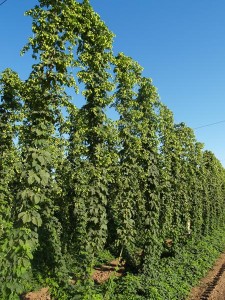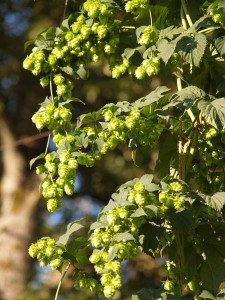Barley, water, yeast and hops are the four essential ingredients to make beer.
The variety of hops, and how the brew master uses them during the brewing process, contribute to making each beer unique, John Annen of Annen Bros. Farm in Mount Angel said.
“Without hops, beer would be sweet water,” Gayle Goschie of Goschie Farms said.
Just as each hop variety has its own unique flavor, aroma and bitterness, three local hop farms – Goschie, 4B and Annen – contribute in their own way to the hop market.
Jeff Butsch of 4B Farms grows four varieties of hops – Sterling, Nugget, Mount Hood and Palisade – which he sells directly to a broker.
“We don’t know what breweries use our hops,” Butsch said.
At Annen Farms, Annen sells to several breweries as well as to a co-op in Washington. The farm is a part-owner of the co-op, with two other farms from Oregon and three farms from Washington. The hops from the co-op are sold to 1,200 breweries.
Goschie sells to several breweries as well as a couple of brokers. She enjoys walking down the beer aisle at Roth’s grocery store and seeing the breweries that use her hops, including Deschutes, Bridgeport, Widmer Brothers Brewing, Sierra Nevada, and many more across the US.
All third-generation hop farmers, Goschie, Butsch and Annen each said they use many of the same farm practices as their ancestors.
Noon – 11 p.m.
Friday, April 27 & Saturday, April 28
Oregon Garden Pavilion
879 W. Main St., Silverton
Hand-crafted beers,
Pacific Northwest brewers,
music, food Tickets: $15.
Includes admission,
five tasting tickets,
festival mug.
503-874-8100 or
oregongarden.org
According to the Oregon Hop Commission, the majority of hops are grown by third and fourth generation farmers. The cost of the equipment and hop house and establishing fields prevents new farmers from getting into hops, said Nancy Frketich, Oregon Hop Commission administrator.
Oregon is the second largest hop producer in the U.S., with Washington first and Idaho, third. The state produces about 17 percent of the U.S. market share or about 5 percent of the hops grown in the world.
But production has diminished in recent years. In 2008, there were 6,370 acres of hops grown in Oregon compared to 4,202 in 2011.
“Growing hops requires a great deal of hands-on work,” Butsch said. “We have to restring the trellis system of poles, cables and wire, and hand train the vine onto the trellis.”
“Hop farming hasn’t changed much since the time my grandfather started growing them,” Annen said. “You still have to restring the trellis system and train the hops. It’s basically the same work.”
Goschie Farms
In 1905, Carl Goschie planted the first hop fields near Lone Pine Corner.
While her grandfather grew only a few hop varieties, Goschie and her brothers Glenn and Gordon grow a dozen different varieties on 400 acres, equaling about 500,000 pounds of hops.
“Most beers have more than one type of hops,” she said. “Each variety of hops creates a different taste and bitterness.”
Like neighboring farms, Goschie Farms once sold a majority of its hops to Anheuser Busch that was purchased by Belgian beer company, InBev, in 2008. The purchase resulted in the company buying less hops from local farmers.
Goschie Farms now sells to brokers who in turn sell the hops to breweries. They also sell directly to craft breweries as well as MillerCoors.
“At harvest time, we have brewmasters coming to the farm and walking through the fields,” she said. “They really are like kids in a candy store as they walk through the fields, smell the hops on the vines and see the hops on the drying floor.”
She enjoys meeting with the brewmasters and discussing current trends. She appreciates the care and passion the brewmasters put into making beer.
“There is a real pride in being connected with all the breweries we work with,” Goschie said. “I haven’t met a brewer large or small who isn’t dedicated to producing a quality product.”
Goschie attends conferences to learn what’s happening in the craft brew industry. Eager to learn, Goschie has taken a brewmaster course. She is experimenting with low trellis hops and is growing some organic hops. The farm is also Certified Salmon Safe.
“As the third generation to grow hops, there is a history and responsibility we have as farmers,” Goschie said. “We recognize how unique we are that we have lived in one small area for over 100 years and we have produced one unique product.”
Incorporate in 1972, Jeff and Linda Butsch, James and Donna Butsch, and Lori and Derek Pavlicek are the owners of 4B Farms in Mount Angel.
Since 1910, Jeff Butsch said the family has been in and out of hop farming.
“We started growing them seriously again in 1985,” Jeff said. “We now grow four varieties – Sterling, Nugget, Mount Hood and Palisades.”
The hops are sold directly to a broker who sells to the breweries, Jeff said.
“We grow just what the market needs,” he said. “We are taking out 10 acres of Palisade and rotating the ground to some other crop because Palisade is not marketable.”
A perennial, hops are planted in the spring when the ground is dry, Butsch said.
“The first year, there is almost zero hops,” he said. “It’s not until the second year that you have a crop.”
That means, he said, he has to know what hop variety to plant in 2012 to provide what the broker is looking to buy in 2014.
“We talk to the breweries to get a feeling what they are looking for,” he said. “The Hop Growers Commission invites craft brewers and merchants to the fields for tours and to talk with hop growers about where they see the market going.”
Besides growing hops on 252 acres, 4B Farm grows hazelnuts, grass seed, row crops, elephant garlic, seed garlic and radish seed.
“Hops are a very unique crop,” Butsch said. “We have a lot of knowledge about growing hops and we enjoy growing them. They take a lot of hands-on labor.”
Along with his sister, Lori, Jeff said his family takes a great deal of pride in their land and they enjoy the traditions each season and crop brings.
A unique crop, maybe that’s why hops garner people’s attention, he added.
“Hops are the spice of the beer,” Lori Pavlicek said. “They are what give the beer a little zip.”
Annen Farms
John Annen, 53, said his great grandfather followed the monks to Mount Angel when they came to build the Abbey.”
“He started farming in 1865,” he said.
Annen grows 16 hop varieties on 265 acres. He recently planted a hazelnut orchard, too.
In the early days, farmers grew hops on five to 20 acres, he said, adding the cost of equipment and a downturn in hop prices forced small farmers to get out of the hop growing business.
“Annen Farms purchased the second stationary hop picker in the Willamette Valley,” he said. Many farmers stopped growing hops because of the cost of equipment along with various regulations. “Before the stationary hop picker, it took 12 hours to pick three or four acres of hops. It now takes an hour to pick one acre.”
Annen sells directly to less than a dozen breweries, including Seven Brides in Silverton. Some hops go to Hop Union, the Washington co-op owned by Annen and other growers.
Annen said he used to grow and sell directly to Anheuser Busch.
“We were just a vendor number in a computer program to them,” he said. “We slowly ended our contracts with the mega brewery industry because we saw where they were going.”
Annen started working with craft brewers in the 1980s.
“We were one of the first hop farms to dedicate our hops to the craft market exclusively,” he said. “Craft beer has become a larger and larger percentage of the beer consumed. Craft beer uses more hops – in some cases three times more.”
Declining to name the hops he grows or who he sells to, Annen said, “Some varieties we grow, no one else grows. We get our hop starts out of the world collection and grow them in our greenhouses before we plant them in the fields.”
He already knows who he will be selling to in 2015. “I like dealing directly with the craft brewers because they are the finest people in the world,” he said. “They are hard-working and they truly care about the quality of their product.”
Just as every brewer sets himself apart by the type of hops he uses and how he brews, so each hop farmer does by what time of day the hops are picked, how they are dried in the kiln and how long they are left on the hop floor before bailing, Annen said.
“There is a science and an art to growing hops,” he said.

